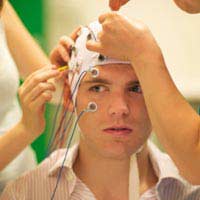Using Neurofeedback to Treat ADHD

Neurofeedback is a method that is aimed at ‘training’ a person’s brain activity to improve brain functioning. It works to balance a person’s brain activity and bring it to a normal level. While previous studies showed mixed results and responses, a new one suggests that it is time to take a closer look at neurofeedback to treat ADHD.
How Neurofeedback Works
Neurofeedback works to address brain patterns. The idea is that each person has a number of different brain wave patterns, which vary depending on their mental state at the time. By using an electroencephalogram (EEG), these patterns can be measured and recorded.What it means is that a neurofeedback practitioner is able to construct a ‘map’ of sorts that represents your brain activity. For people who have ADHD, they may be using more of one kind of brain activity when they need to use another. For example, it may mean a person is not focusing and instead, they are daydreaming.
Through multiple sessions, a practitioner shows the person with ADHD how to control brain activity. The hope is that a person can function more optimally once they have better control over their brain activity and how they behave as a result.
Mental Health, Learning Disabilities and ADHD
For this reason, it is generally used to help people with mental health disorders or learning disabilities. Older studies on people who have ADHD suggested it may be able to help but there has been a lot of debate and controversy over its use for ADHD.A new study from last year, however, found it very effective in ADHD. Also known as EEG biofeedback, neurofeedback works to either suppress or produce brain activity, depending on the needs of the person. It is used in many disorders but much of the criticism and controversy is surrounding its efficacy.
How Effective is Neurofeedback?
Neurofeedback can be challenging to assess in terms of scientific studies and evidence. This recent study, however, is a more robust one that gives further credence to its use in those who have ADHD.Researchers conducted a meta-analysis of fifteen studies and more than a thousand ADHD patients. They concluded that neurofeedback could be recommended as an evidence-based approach in treating people who struggle with ADHD.
Positive Results for Neurofeedback in ADHD
In particular, they found that after looking at all of these studies, neurofeedback treatment shows significant promise for its use in the focusing and inattention problems associated with ADHD. It also helps to reduce impulsive behaviours.The researchers do warn that their findings show that neurofeedback can only be considered an evidence-based treatment for those who have ADHD. It is not necessarily an evidence-based treatment for other disorders. Each disorder has to be assessed separately.


Re: Inside the ADHD Brain
This was really helpful! Recommend reading.
Re: Distinguishing Between ADHD and the Bright Child
A person with ADHD can show hyper focus on something that interests them, when they are in their "flow",…
Re: Conquering ADHD
I was told by my daughter Peditrishion that I could get help with my 9 year old daughter's behaviour she was referring me to somboadys else on…
Re: Why Do Some Teenagers With ADHD Self Harm?
I was born with ADHD and Iam now 17 year old adolescent.I suffer still with that problem and I am vulnerable to…
Re: Is ADHD Hereditary?
Dear coach4learn: The views you seem to be projecting are a blatant disregard towards the obvious truth regarding attention…
Re: ADHD in Adults
Stumbled upon this. Not really computer literate. You are describing me. What I hate most is my wife continually shouting at me that I "just don't…
Re: ADHD and Dyslexia
Jackie - Your Question:My son has is 8 years old now and can hardly read. He does not read. It seems as if he is struggling to get the alphabet…
Re: ADHD and Dyslexia
My son has is 8 years old now and can hardly read. He does not read. It seems as if he is struggling to get the alphabet in "his head". His…
Re: ADHD in Adults
My son has had problems since he was born but never diagnosed he has been in lots of trouble with the authorities and broken relationships. He self…
Re: The Difference Between Bad Behaviour and ADHD
i have 13yr old son, he has been diagnosed adhd since age 7yr. old until now we keep on visiting his doctor.…